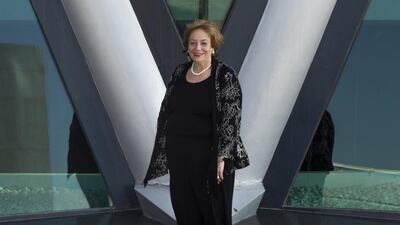Margery Kraus, founder, president and chief executive of Apco Worldwide, was leaving younger executives in her wake.
She had chaired an all-day board-meeting in Brussels, endured the overnight “red-eye” flight from Europe to Dubai, gone straight to the Women in Leadership Economic Forum in Dubai, moderated several sessions there, and was lining up for interviews, photo-shoots and another round of forum networking.
“I can’t keep up with her, and she’s 70. She has more energy than me, that’s for sure,” said one of her senior executives in Dubai, wilting under the pressure.
Ms Kraus, who is a grandmother of 10 children, certainly has not lost the dynamism that led her to found Apco thirty years ago in Washington DC, and forge it into one of the world’s biggest communication companies with 30 offices dotted round the world and 650 employees.
She launches into business straight away. “It was right to come from the board meeting straight to the Middle East, because at the meeting we agreed that the region has the potential to be one of our the fastest growing areas for the group. It’s high on our list of priorities,” she says.
Apco has had a presence in the region for the past ten years, but took a quantum step four years when it bought Jiwin, the communications business previously owned by Dubai Holding. “The deal has excelled expectations. Jiwin has become globalised in its outlook, and we have been able to show clients we have local knowledge in a part of the world they are interested in but know little about. It’s a classic glocal proposition, global plus local,” she explains.
Apco’s international business deals with some of the biggest names in the business. Ms Kraus reels off a list of corporate clients that sounds like a take from Fortune 500 – Johnson & Johnson, BlackBerry, Pfizer, eBay, Mars – as well as governments ranging from Hong Kong to India and South Africa.
The approach to communications in the UAE, and wider Middle East, is different from the needs of those big players, she acknowledges, but she says Apco has been able to bridge the gap. “There have never been any cultural issues in the UAE. We are good at offering up the benefits of our experience, but not at imposing that on clients,” she says.
Nonetheless, she believes the region has its own special needs in communication. “Social media is becoming the dominant platform here, and UAE leaders in particular are becoming very good at it. They are well followed not just here, but around the world.
“But governments have to realise they cannot be gatekeepers for information in the current age. In the US, government leaks like a sieve, which is not the way here. It’s more of a two-way knowledge-sharing process,” she says.
Advising governments and government-related agencies has become a speciality for Apco, accounting for up to 30 per cent of global revenue, and it is a useful skill to have in the region, where there is much greater overlap between public and private sectors than elsewhere.
Apco has exploited its expertise via what Ms Kraus called the BOT programme, standing for “build, operate, transfer”, by which an Apco team is seconded to an organisation to build its communications function, operate it for a time within the company or government body, and then transfer it as a fully-functioning unit to the organisation. Some of the biggest bodies of the UAE have used Apco for this purpose, including the Dubai Executive Office and the UAE office of cabinet Affairs, as well as the government of Sharjah. The new airport Dubai World Central is also a client with a five-person team that will eventually form the nucleus of its communications function.
Her other pet project of late has been the “champion brands” initiative, by which Apco identifies the top 100 leading business marks in the world, ranked according to four key indicators: alignment, authenticity, attachment and advocacy. The are no Middle East companies on the list so far, but Ms Kraus believes Emirates and Etihad Airways could be there eventually.
As a global company, Apco has looked for growth outside its traditional hinterland of the US, though this is still its biggest market. “The world is divided into two these days: between the growth markets and the older markets. In the US and in Europe, there is still growth, but there are also threats in the aftermath of the economic crisis and regulation has become an increasingly important factor.
“So we are looking to the growth markets – Asia, the Middle East – raise the top line. This is where there is fundamental growth, and we are still relatively under-represented in those markets. It is a priority.” she says.
Russia has also been a long-term growth focus, and area of personal interest, for Ms Kraus. The recent economic and financial problems there have changed the approach. “There is still growth potentially there, but the big issue is to try to figure out what the future holds,” she says.
She has a long-standing relationship with Mikhail Khodorkovsky, the former oil magnate recently released from a Siberian prison, who has said he would be willing to play a senior role in Russian politics if ever he was wanted. Flashing a picture of her and Mr Khodorkovsky together in Switzerland earlier this year, she explains: “But he is a friend, rather than a client.”
fkane@thenational.ae
Follow The National's Business section on Twitter

